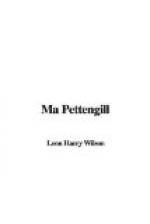It was this here assistant to her father, who was named Professor Oswald Pennypacker; and he was a difficult aim in life, because he didn’t need a wife any more than the little dicky birds need wrist watches. You seen his picture there. About thirty-five he was and had devoted all his years to finding out the names of wild animals, which is said to be one of our best sciences. He hadn’t got round to women yet. A good snappy skeleton of one might of entertained him if he could of dug it up himself and called it a sedimentary limestone; but he had never trifled with one that was still in commission and ornamented with flesh and clothes.
And fussy! I wish you could of seen that man’s room after he had carefully unpacked! A place for everything, and he had everything, too—everything in the world. And if someone switched his soap over to where his tooth paste belonged it upset his whole day. The Chink never dared to go into his room after the first morning. Oswald even made his own bed. Easy to call him an old maid, but I never saw any woman suffer as much agony in her neatness.
His shoes had to be in a row, and his clothes and hats and caps had to be in a row, and there was only one hook in the room his pyjamas could lawfully hang on, and his talcum powder had to stand exactly between the mosquito dope and the bay rum, which had to be flanked precisely by his manicure tools and succeeded by something he put on his hair, which was going the way of all flesh. If some marauder had entered his room in the night and moved his compass over to where his fountain pen belonged he would of woke up instantly and screamed.
And then his new wardrobe trunk! This was a great and holy joy that had come into his bleak life; all new and shiny and complicated, with a beautiful brass lock, one side for clothes on correct hangers and the other side full of drawers and compartments and secret recesses, where he could hide things from himself. It was like a furnished flat, that trunk. And this was his first adventure out in the great cruel world with it. He cherished it as a man had ought to cherish his bride.
He had me in to gaze upon it that first afternoon. You’d of thought he was trying to sell it to me, the way he showed it off. It stood on end, having a bulge like a watermelon in the top, so no vandal could stand it up wrong; and it was wide open to show the two insides. He opened up every room in it, so I could marvel at ’em. He fawned on that trunk. And at the last he showed me a little brass hook he had screwed into the side where the clothes hangers was. It was a very important hook. He hung the keys of the trunk on it; two keys, strung on a cord, and the cord neatly on the hook. This, he told me, was so the keys would never get lost.
“I always have a dread I may lose those keys,” says he. “That would be a catastrophe indeed, would it not? So I plan to keep them on that hook; then I shall always know where they are.”




